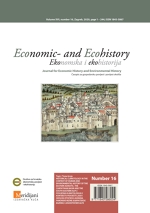Natural Disasters on the Island of Vis in the 1930s: Analysis of Natural Hazards in the Context of the Development and Importance of Winemaking and Viticulture
Natural Disasters on the Island of Vis in the 1930s: Analysis of Natural Hazards in the Context of the Development and Importance of Winemaking and Viticulture
Author(s): Nikola Ostojčić, Vinko UdiljakSubject(s): Agriculture, Energy and Environmental Studies, Economic history, Local History / Microhistory, Environmental interactions, Interwar Period (1920 - 1939)
Published by: Društvo za hrvatsku ekonomsku povijest i ekohistoriju - Izdavačka kuća Meridijani
Keywords: environmental history; island of Vis; weather-induced events; viticulture; economic history;
Summary/Abstract: Weather changes and their belonging manifestations in the form of meteorological phenomena have always been largely associated with economic ascents and descents, and have entailed a series of economic, cultural and political changes that have left their mark on the entire history of a particular region. Meteorological changes, but causally also those in the economy, are also visible in the 1930s in the Adriatic region, where in some cases they completely destroyed economic activities and yields. This paper deals with the disasters that plagued the island of Vis in the period from 1935 to 1939 on numerous occasions and in various occurrences. Some contemporary newspaper articles in Split’s Novo doba, Jadranski dnevnik and Jadranska straža remained, as well as detailed writings on the destruction of vineyards and yields in the fund for the Economy of the Banovina of Croatia (HDA, BH-OSG, IV, 39039-44 / 1939). The overall problem has been viewed from multiple perspectives; variability of weather and its impact on the overall situation, natural hazards as a considerable factor in the complete destruction of viticulture and their reciprocal echoes, and people‘s perceptions of these hazards as disasters that present themselves within the confines of oral history.
Journal: Ekonomska i ekohistorija - Časopis za gospodarsku povijest i povijest okoliša
- Issue Year: 2020
- Issue No: 16
- Page Range: 219-233
- Page Count: 15
- Language: English

